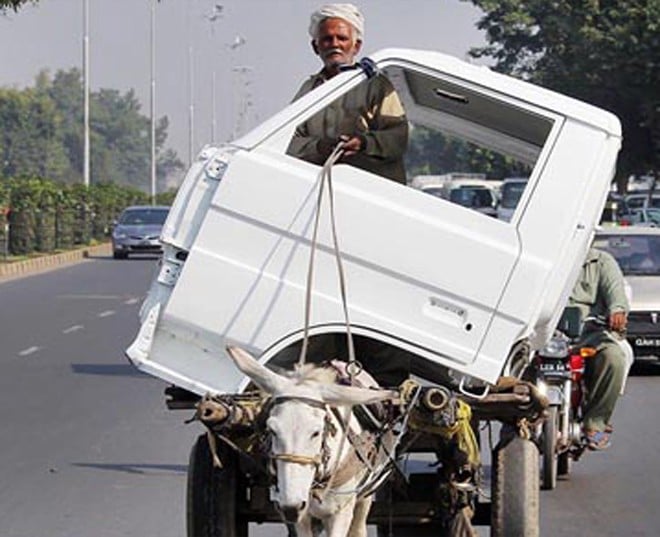
Taking a cue from Punjab, donkeys are also being discussed in Khyber Pakhtunkhwa where the prices of the hides are on the rise

Reports of the sale of donkey meat in parts of Punjab have caused concern among the people in Khyber Pakhtunkhwa, even though no such case has yet been reported in the province.
However, more relevant presently is the likely impact that the rise in the prices of donkey hides in the country could have in the province. Though the authorities and the local traders maintain that this business is non-existent in the province, some believe the rising prices could tempt people, primarily butchers to start buying and killing donkeys for their expensive hides.
In Khyber Pakhtunkhwa, the price of a healthy and at least two-year old donkey is in the range of Rs 15,000 to 20,000. "A donkey costing Rs 10,000 two to three months back should be considered almost free if one can get it for 15,000 nowadays. Donkeys are in huge demand and don’t know for what reason," says Asim Khan, a donkey-cart owner.
A local butcher, Muhammad Arif, who also collects and sells animal hides, says he understands why the hard-working animal has become so precious in recent months. "I hear from other butchers that donkeys are in great demand in Punjab. They are slaughtered mainly for their skins, which people say are used in cosmetics," he says.
The donkey meat is seemingly a by-product that is allegedly sold in the market. It is the skin that bags the prize for persons involved in the business of selling donkey hides.
"A hide can be sold for up to Rs 8,000 as it is used in cosmetics made locally as well as in Chinese-made beauty products. Polished donkey hide is also sold as a replacement for horse hide and is used in furniture," says a person associated with the hide business on the condition of anonymity.
There is as yet no trace of the business of selling donkey meat in Khyber Pakhtunkhwa in recent months. Last year though, there was a report alleging that three butchers were found selling donkey meat in the semi-urban Tehkal village in Peshawar. However, the report wasn’t confirmed.
Still, a number of Peshawar residents, including Sajjad Ali, say they were alarmed by the recent reports that donkey meat was seized in Punjab. "My family members have stopped eating meat at restaurants as we do not know what meat is being served to the customers. Unless I have seen the animal being slaughtered, I don’t even purchase meat from the market," Sajjad Ali adds.
Another resident of Peshawar, Ahmad Zeb, informs that his family gets its stock of meat from their village twice a month. "We trust the butcher in our village as we have known him and his family for generations. They have never slaughtered an ill animal, let alone a non-permissible one," he adds.
In recent weeks, the Peshawar district administration has raided and penalised a number of hotels and eateries for hygienic reasons, but not a single place was found selling haram meat of donkeys or other animals.
Also read: Hide and meat
The district administration took interest in the matter as news reports about the issue emerged from Punjab. Additional Deputy Commissioner Peshawar, Osama Ahmad Warraich, believes the sale of donkey meat is not a problem in Peshawar and in the province. "Like all other issues that the district administration Peshawar has addressed, we have looked into the possibility of the sale of donkey meat. We did not find anyone involved in the business and nobody made a complaint to us," he tells TNS.
Sharafat Ali Mubarak, president Central Traders Association, Khyber Pakhtunkhwa, opines that the donkey hide business is non-existent in the province. However, he says it is rapidly growing in other parts of the country. "Pakistan has the cheapest prices for donkey hides in the world. A full skin is available for Rs 6,000 to 8,000 in the market, which is seen as way too cheap in the international market. Amazingly, the donkey skins cost around Rs 1,500 only until last year," he recalls.
He adds that the hides are mostly exported to China and some European countries for use in the production of cosmetic products. "The donkey skins are chemically processed to make ‘glue’ and it is then used in beauty products. Besides, the donkey hide and mule-skin are also used in cushions for furniture in foreign countries," he says.